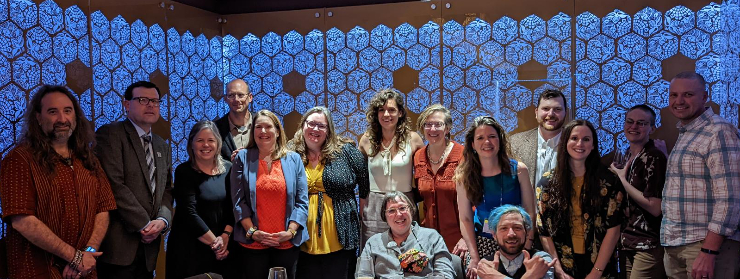A Tribute to Professor Emeritus Judith A. Habicht-Mauche
by David A. Ingleman
At the 87th Annual Meeting of the Society for American Archaeology (SAA), held in Chicago from March 29 to April 2, 2022, the distinguished career of Professor Emeritus Judith A. Habicht-Mauche was celebrated by her students, former students, and colleagues. During a poster session entitled “Archaeologies of Practice: Research in Honor of Judith A. Habicht-Mauche,” archaeologists, both young and old, presented research about a variety of topics, ranging from petroglyphs to pueblos. The diversity, quality, and creativity of the presentations reflected the growth of the intellectual communities that Prof. Habicht-Mauche has helped to lead for decades. At a dinner party held afterwards, her closest associates toasted her career by remembering their favorite Judith stories, jovially recalling her compassion and humor. Another highlight of the conference was the SAA’s presentation of the prestigious Dissertation Award to Dr. Danielle Dadiego—an honor that was coincidentally first bestowed on her mentor, Prof. Habicht-Mauche, more than three decades earlier.
Prof. Habicht-Mauche was born in Buffalo, New York to Robert and Marion Habicht. As she later recalled in the opening pages of her dissertation, family road trips to the American West “kindled” the future scholar’s “interest in the archaeology, history, and culture of the American Indians.” As an undergraduate, Prof. Habicht-Mauche attended the College of William and Mary, where she heard James Deetz lecture on the ideas that he would later develop in his classic book, In Small Things Forgotten. Inspired by Deetz, Prof. Habicht-Mauche enrolled in Harvard University, intending to study historical archaeology for her PhD. As a curatorial assistant at the Harvard Peabody Museum, she helped to design exhibits and research the North American collections. Ultimately, her committee members, Ian Brown and Jeffrey Brain, and her primary advisor, Stephen Williams, helped her develop an award-winning dissertation on proto-historic Puebloan-Plains interactions. Following stints at the Los Alamos National Laboratory and the School for American Research, where she studied pottery excavated from Arroyo Hondo Pueblo, in 1990, Prof. Habicht-Mauche joined the faculty at the University of California, Santa Cruz. She is known for her innovative application of lead isotope analysis to Southwestern glaze-painted pottery and to her Southwesternist colleagues as a leader of the self-described “glazeware mafia,” with Suzanne Eckert, Kari Schleher, and Deborah Huntley. In 2009, the SAA presented Prof. Habicht-Mauche with its Award for Excellence in Archaeological Analysis, which honors an archaeologist whose “innovative and enduring research has made a significant impact on the discipline.” Prof. Habicht-Mauche retired in 2021, but continues to advise students as well as research and write. She lives in Santa Fe, New Mexico with her husband Chris and rabbit Pakal.

